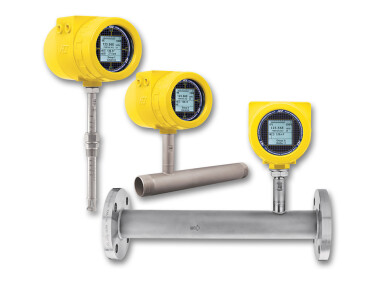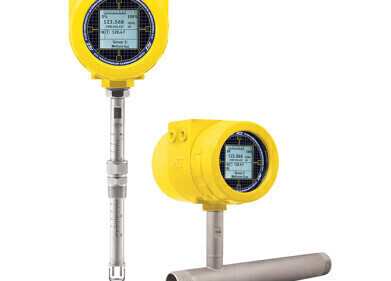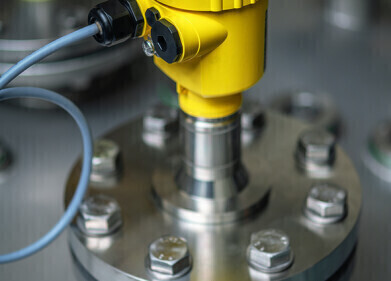Flow Level Pressure
New Mini CORI-FLOW is Smallest Coriolis Instrumentation Yet
Jun 18 2008
CORI-FLOW has been specifically developed to precisely measure very low flow rates, down to a few grams an hour, although larger models will handle up to 30kg/hr and beyond. The unique design of the Coriolis sensor delivers unsurpassed performance, irrespective of changing operating conditions with regard to pressure, temperature, density, conductivity and viscosity.
Suitable for both liquid and gas flow applications and capable of bi-directional measurement, Mini CORI-FLOW instruments are equipped with robust IP65 weatherproof housings and available with ATEX approval for use in hazardous areas; while the controllers feature adaptable PID controls for regulating integral or separately-mounted electronic control valves. Typical applications include research laboratories, pilot plants and fuel cell processing, analytical installations and anywhere requiring directmass flowmeasurement, independent of fluid properties. Prices are highly competitive.
The Coriolis effect, first identified by a French scientist of that name, is the tendency for any moving body to drift sideways from its course, due to the earth’s rotation. A major practical application of this effect is mass flowmeasurement and, in the Mini CORI-FLOWseries, the fluid flows through a vibrating tube, causing a variable phase shift, which is detected by sensors and fed to an integral PC board, with the resulting output exactly proportional to the mass flow rate. Whilst other flow measuring principles require correction for changes in fluid temperature, pressure, viscosity and density, Coriolis devices are independent of these properties and will exactly measure fluid throughput, no matter whether it is in a gaseous or liquid state.
Notable for their high accuracy and fast measuring signal, traditional Coriolis mass flow meters tend to be large, requiring robust mountings and sizeable concrete plinths, and are typically applied to medium-to-high flow rates, with measurement of low rates usually complicated and costly. Now, building upon the success of its existing CORI-FLOW design, which is a quarter the size of standard units, Bronkhorst’s new Mini CORI-FLOWis around 16x smaller than normal, with a basic footprint of just 80mm x 32mm and an overall height of 144mm. Moreover, both meters and controllers have been developed to cover the needs of the low flow market, at a fraction of usual costs, with different models providing overlapping maximum flow rates up to 30kg/hr.
The new Mini CORI-FLOW series features state-of-the-art digital technology, offering standard fieldbus interface options and additional functions such as totalisation and alarms. The PC boards on the range’s mass flow controllers (MFCs) additionally allow fast and smooth control of electrically-driven valves, either integrated onto the device or separately mounted for special tasks. The flow controllers have the same footprint as traditional thermal MFCs and feature the same options for analog and fieldbus communications, enabling quick and easy instrument exchange.
For applications where a control valve is not appropriate, such as when a liquid cannot be pressurised, a Mini CORI-FLOW liquid dosing system can be supplied in various flow capacities. This comprises a virtually pulse-free gear pump, close coupled to the Coriolis flow meter, complete with check valve, filter and interconnecting pipework, in a simple, compact assembly. Again, the pump is regulated by the onboard PID controller, via a voltage output signal.
Bronkhorst UK has identified a number of interesting applications for this unique Coriolis technology and can assist in the development of customised solutions. These include the measurement and control of additives being dosed into a main product stream; the supercritical measurement of difficult-to-monitor fluids like carbon dioxide and ethylene, where they are midway between a liquid and a gas; the delivery of precursor fluids, either as gases or liquids, in deposition processes; and as a batch process counter, where each batch can be programmed into the integrated counter limit value, then the valve closed until reset.
Digital Edition
PIN 25.5 Oct/Nov 2024
November 2024
Analytical Instrumentation - Picturing Viscosity – How Can a Viscometer or a Rheometer Benefit You? - Sustainable Grease Formulations: Evaluating Key Performance Parameters and Testing Method...
View all digital editions
Events
Dec 03 2024 Dusseldorf, Germany
Dec 08 2024 Anaheim, CA, USA
Turkey & Black Sea Oil and Gas
Dec 11 2024 Istanbul, Turkey
Dec 19 2024 Aurangabad, India
Jan 20 2025 San Diego, CA, USA



















